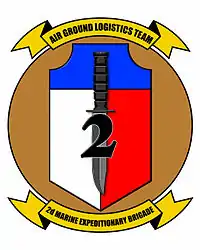
Task Force Tarawa (TFT) was the name given to the 2nd Marine Expeditionary Brigade during the 2003 invasion of Iraq. It was a Marine Air-Ground Task Force commanded by Brigadier General Richard F. Natonski[1] that was attached to the I Marine Expeditionary Force during the course of the invasion and was most notable for its participation in the heavy fighting in the city of an-Nāṣiriyyah. During its time supporting Operation Iraqi Freedom, the task force suffered 23 Marines killed in action.
Deployment
The 7,100 Marines and Sailors of TFT departed Marine Corps Base Camp Lejeune, North Carolina on January 15, 2003. They were transported on seven United States Navy ships that together formed Amphibious Task Force East (ATF East); otherwise nicknamed the 'Magnificent Seven'. The ships were the USS Kearsarge (LHD-3), USS Saipan (LHA-2), USS Bataan (LHD-5), USS Ashland (LSD-48), USS Portland (LSD-37), USS Gunston Hall (LSD-44), and the USS Ponce (LPD-15).[2] ATF East arrived in Kuwait on February 15, 2003 and quickly debarked their aircraft and ships then headed into the northern Kuwaiti desert.
The Task force's equipment consisted of 81 aircraft, 46 Amphibious Assault Vehicles, 24 LAVs, 14 M1A1 Abrams tanks, 18 M198 howitzers, and 4 M9 ACEs. (however they only had 12 Abrams when the fighting started.)
Operation Iraqi Freedom
TFT crossed into Iraq on March 21, 2003 with the missions of securing Jalibah Airfield and then securing the 3 bridges over the Euphrates River at An Nasiriyah to allow the 1st Marine Division to continue its attack north. From March 23 to March 29, 2003, Task Force Tarawa was engaged in heavy fighting in and around the city of An Nasiriyah as they came in contact with Saddam Hussein’s Fedayeen and members of the Iraqi 11th Infantry Division. TFT lost 18 Marines in the fighting and were involved in a friendly fire incident in which two A-10 Warthog aircraft killed a number of Marines when they strafed their Amphibious Assault Vehicles with 30mm depleted uranium rounds and Maverick missiles. The A-10 pilots were not prosecuted.
During this time the original task force grew with the additions of the 15th and 24th Marine Expeditionary Units. The Marines of TFT were the first U.S. unit to come in contact with the remnants of the 507th Maintenance Company after they were ambushed and later on were on standby to assist with the rescue of prisoner of war PFC Jessica Lynch.
After leaving An Nasiriyah, the Task Force was tasked with securing the highways to the rear of the 1st Marine Division and on April 3, 2003 they secured the town of Ad Diwaniyah. They continued to move and on April 7, pushed into Al Amarah, securing the 10th Armoured Division HQ and the nearby Al Amarah airfield and finally ended the invasion outside of Baghdad after conducting security and stabilization operations in Al Kut on April 11.
On May 14, 2003 Task Force Tarawa turned its Area of Operations over to the 1st Marine Division and returned to the United States via naval ship.
While en route back to the United States on June 12, 2003, 3rd Battalion 2nd Marines (3/2) while aboard USS Kearsarge (LHD-3) was deployed in support of Operation Shining Express to support the rescue of U.S. embassy personnel and American citizens during the Second Liberian Civil War.
Order of battle
- 2nd Marine Expeditionary Brigade - BGen R.F. Natonski
- Company A, 8th Communication Battalion
- Detachment, 2nd Intelligence Battalion - Maj J.P. Christopher
- Detachment, 2nd Radio Battalion - Maj T. Naughton
- 2nd Marine Regiment
- 1st Battalion, 2nd Marines (1/2)
- 2nd Battalion, 8th Marines (2/8)
- 2nd Battalion, 6th Marines (2/6)
- 3rd Battalion, 2nd Marines (3/2)
- 1st Battalion, 10th Marines (1/10)
- Company C, 2nd Light Armored Reconnaissance Battalion
- Company A, 2nd Reconnaissance Battalion
- Company A, 2nd Assault Amphibian Battalion (Attached to 1/2)
- Company A, 8th Tank Battalion (Attached to 1/2) (deactivated currently Company E, 4th Tank Battalion)
- Company A, 2nd Combat Engineer Battalion
- Company A, 6th Combat Engineer Battalion Battle Creek, MI
- Marine Air Control Group 28
- Marine Aircraft Group 29, MCAS New River, North Carolina
- Marine Aviation Logistics Squadron 29
- HMH-464
- HMLA-269
- HMM-162 - Helicopter Marine Medium
- Combat Service Support Battalion 22
See also
Citations
- ↑ Natonski message.
- ↑ Andrew 2009, pp. 4.
References
- This article incorporates text in the public domain from the United States Marine Corps.
- 2nd MEB website. Retrieved on 2006-08-06.
- Andrew, Rod (2009). "U.S. Marines in Battle An Nasiriyah 23 March - 2 April 2003" (PDF). Marines.mil. United States Marine Corps. Retrieved 2023-09-25.
- Lowry, Richard S. (2004). "The Battle of An Nasiriyah". Military History Online. Retrieved 2006-08-06.
- Feiring, Doug. "Operation Iraqi Freedom: A Personal Account of the Battle of An Nasiriyah". Iraqi Freedom Diary. Retrieved 2006-08-06.
- Natonski, R. F. "Message from the Commanding General 2nd MEB / Task Force Tarawa". Archived from the original on 2006-06-15. Retrieved 2006-08-06.
External links
- Keegan, John (July 1, 2004). "Bumps in the Road". The Iraq War. National Review Online. Retrieved 2006-08-06.
- Henthorn, SSgt Creighton L., Jr. (2003). "Task Force Tarawa: A Personal Perspective of Operation Enduring Freedom". Retrieved 2006-08-06.
{{cite web}}: CS1 maint: multiple names: authors list (link) - Rhodes, Cpl Shawn C. (April 8, 2003). "Task Force Tarawa Marines aid Iraqi Freedom Force in reclaiming town". USMC News. Story ID 20034109350. Retrieved 2006-08-06. Reprinted on GlobalSecurity.org.
- "Task Force Tarawa Marines, lost but not forgotten". The Globe. Retrieved 2006-08-06. Reprinted on Leatherneck.com.
- "2nd Marine Expeditionary Brigade". War in Iraq. CNN.com. Retrieved 2006-08-07.